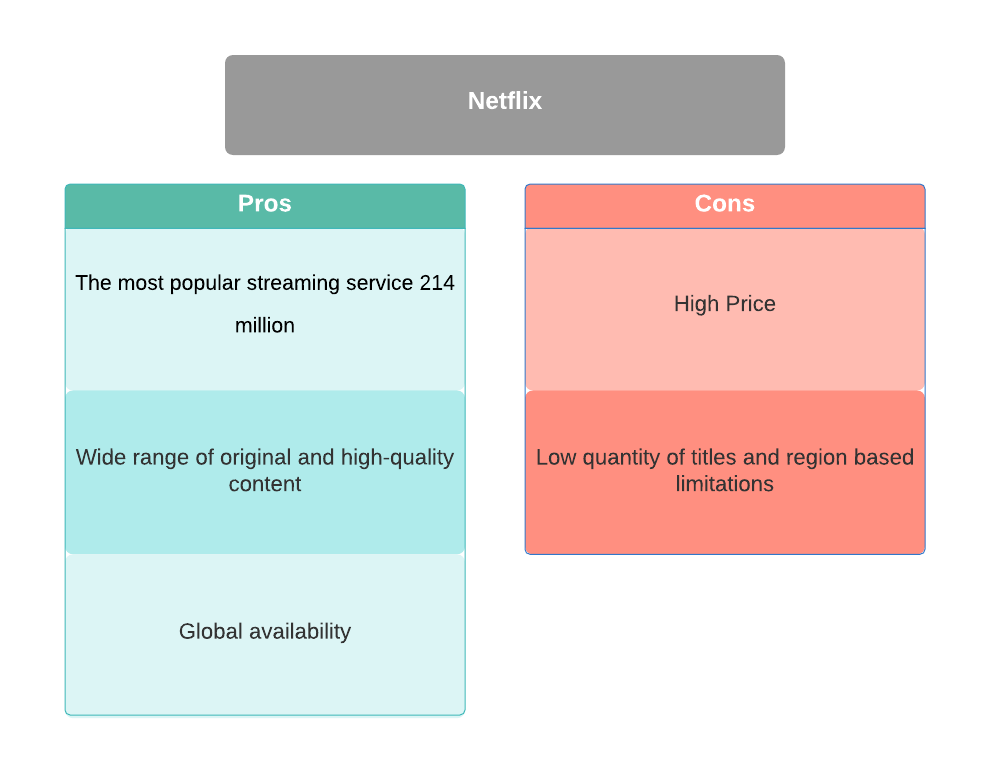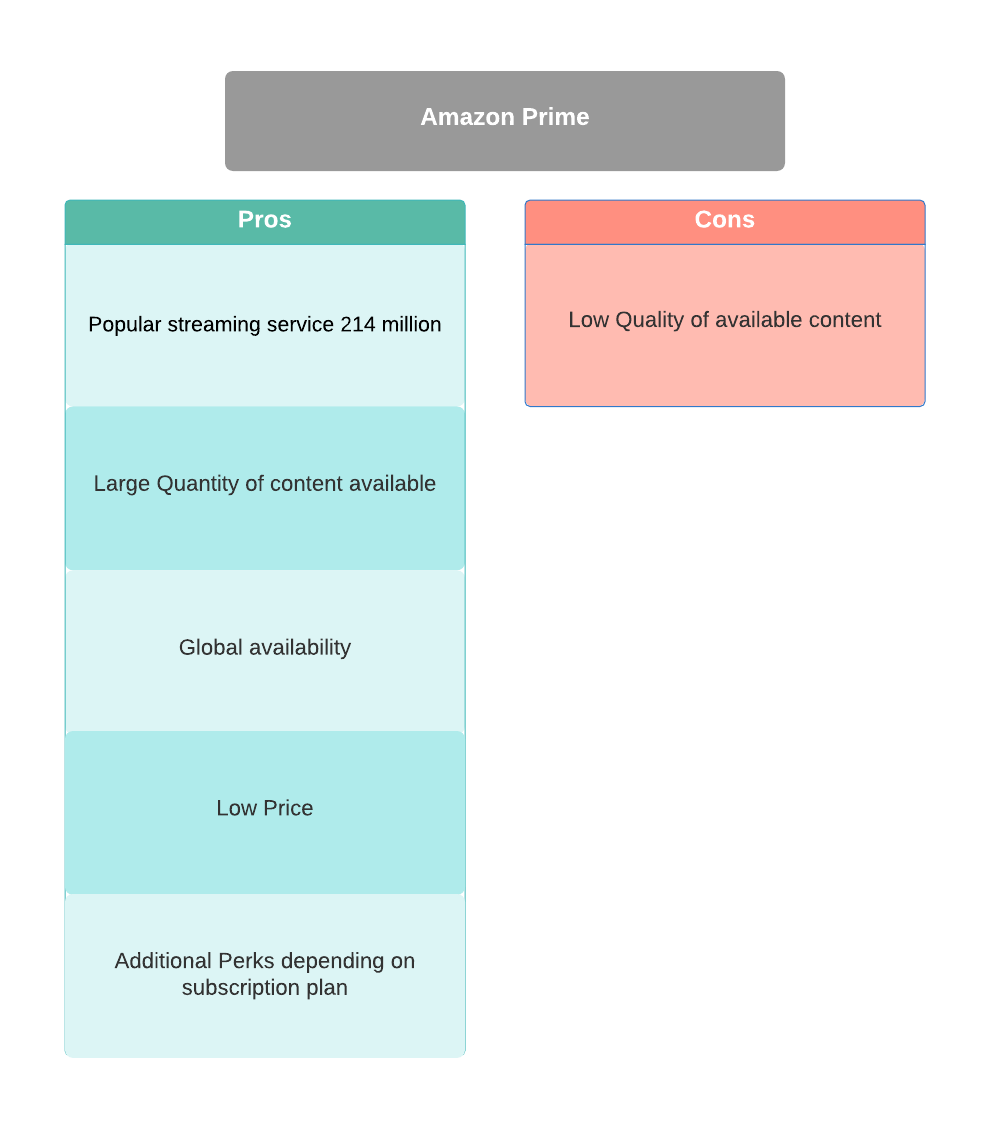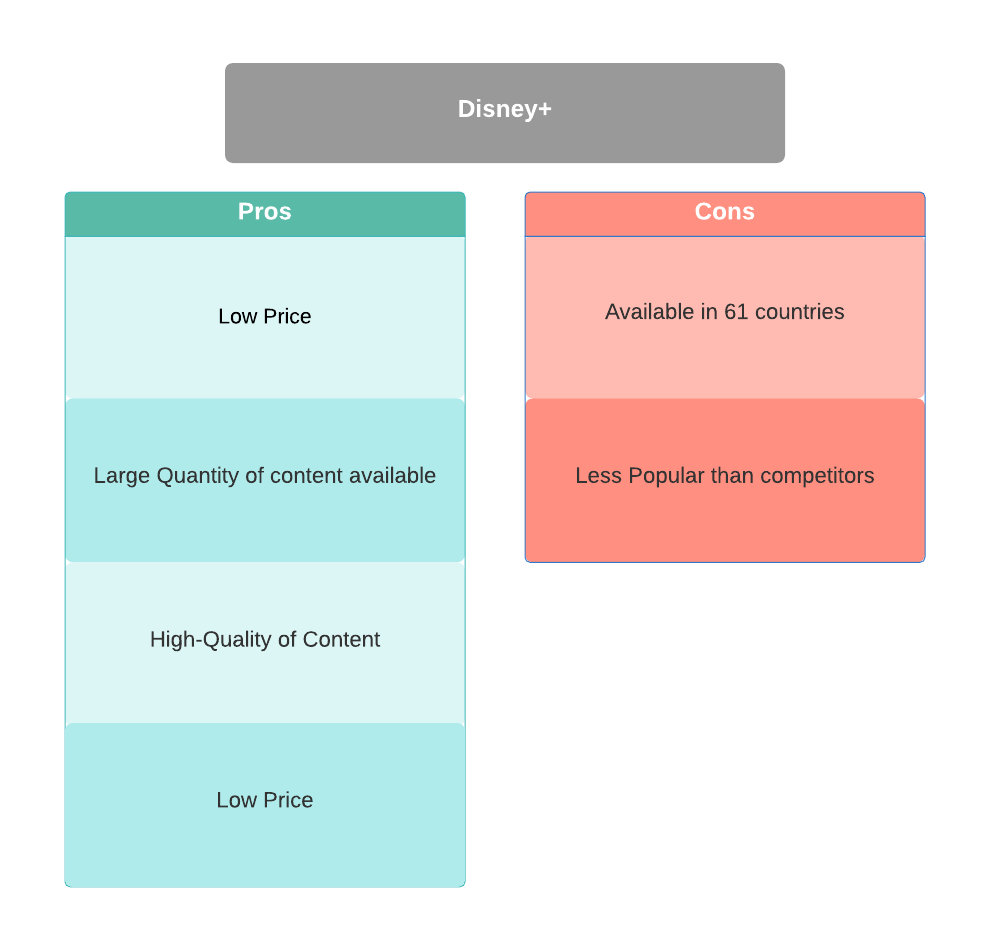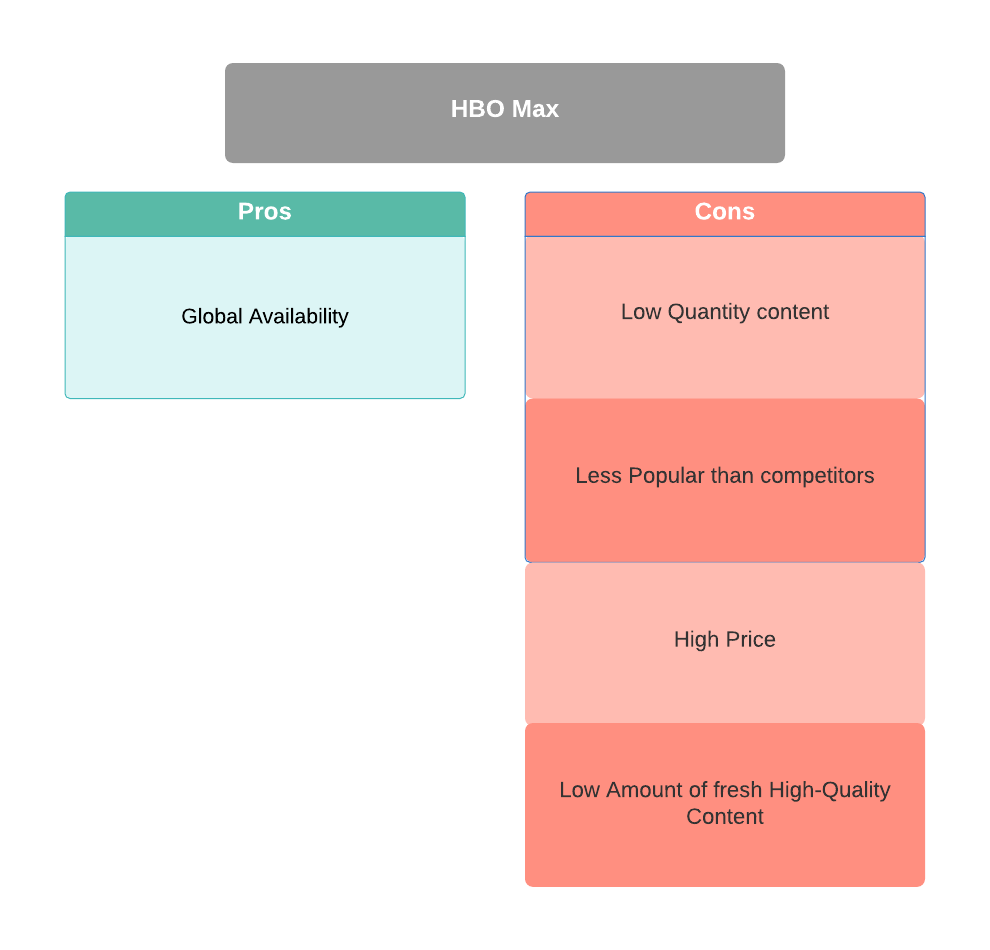Netflix
Netflix remains the biggest streaming service provider in the world due to a variety of reasons. The platform offers original content and classical well-renowned movies and TV shows such as Stranger Things and Squid Game (Frank, 2020; Sherman & Subin, 2021). Despite that, one should remember that Netflix’s selection of films is not as wide, and it may be hard to find new releases (Frank et al., 2020). The company’s pricing policy begins with a monthly fee of $8.99, allowing simultaneous streaming and download on a single device (Frank et al.,2020). However, there are more expensive subscription plans that offer users wider opportunities on the platform. For example, for payment of $13.99, subscribers can watch higher-quality video content on two screens at a time (Frank et al., 2020). Netflix’s pricing secures the company’s revenue, which reached 7.5 billion dollars in the third quarter of 2021 (Sherman & Subin, 2021). While Netflix offers a variety of TV shows and movies, it is questionable whether its pricing policy is compatible enough.
Nevertheless, Netflix is mainly notable due to its personalized recommendations and original content available. Research suggests that the company outpaces other streaming platforms by the number of subscribers, which reflects its availability (Sherman & Subin, 2021). Netflix offers its products to 214 million users worldwide, with more than 74 million of them located in the US and Canada (Sherman & Subin, 2021). Netflix is available in 190 countries, but China, Syria, North Korea, and Crimea have been excluded from the list due to different sanctions imposed by the US administration. Furthermore, among the platform’s subscribers are various customers, including independent viewers and families with children (Frank et al., 2020). Netflix’s global availability and diversity of its users are crucial to the company’s success.
Amazon Prime Video
Amazon Prime Video is one of Netflix’s main competitors, created and privatized by Amazon. The platform’s products include original TV series and movies, but it also offers a collection of older and newer films (Frank et al., 2020). With that being said, research suggests that as the streaming service focuses on its original content, its competitors offer better options to watch more popular movies and TV shows (Frank et al., 2020). In terms of pricing, Amazon provides a much more valuable offer in comparison to Netflix. The subscription costs $9 on its own, but for $13 a month, it is possible to receive all the benefits of Prime membership, including free delivery, Prime Music, and a variety of discounts (Blumenthal, 2021). Alternatively, it is possible to choose a payment of $119 each year (or $9.92 per month) for the same features (Blumenthal, 2021). The results of such an approach are evident in the company’s revenue, as it reached $25 billion, making it the most profitable business among the four platforms (Sherman & Subin, 2021). Amazon Prime Video offers a variety of content and subscription plans.
Amazon undoubtedly overpowers Netflix and other streaming services by the quantity in terms of content provided. However, the evidence suggests that the quality of Amazon’s titles is much more lacking in comparison to others (Frank et al., 2020). Despite that, Amazon Prime can be perceived to be available to customers, as more than 175 million people have used the streaming service in the past year (Frank et al., 2020). Among the platform’s main subscribers are members of Amazon Prime who are fans of classic and independent films (Frank et al., 2020). As Amazon centers around its original content, its competitors offer other films and TV shows of better quality.
Disney+
Disney+ is a streaming service led by one of the industry’s greatest film production owners. The company launched in November 2019, making it a relatively young platform (Sherman & Subin, 2021). Disney+ products focus on content based on popular Disney-owned films, family-friendly films, and several documentary series (Frank, 2020). The company offers considerable competition to the industry leader Netflix in terms of price. In particular, Disney+ offers the cheapest subscription plan among its rivals with an $8 monthly payment, immediate high-quality streaming, and support of up to 4 devices (Blumenthal, 2021). The platform’s pricing policy brought Disney+ a revenue of $18.5 billion (Sherman & Subin, 2021). As a continuation of a world-renowned production company, Disney+ offers unique content at a compatible price.
Furthermore, although Disney+ is relatively young, it is quite available among clients. The platform has a considerable audience of over 118.1 million, even though its distribution is limited to 61 countries (Sherman & Subin, 2021). However, the streaming service is less popular than its competitors, as the offered content may be too familiar and repetitive to certain viewers (Frank et al., 2020). With that being said, the main subscribers are represented by families who are rediscovering classic Disney movies (Frank et al., 2020). Disney+ offers a wide range of films and TV series, but the audience seems to be already familiar with the content.
HBO Max
HBO Max is the streaming service created by HBO, offering diverse content. HBO Max includes original products and already familiar titles such as Rick and Morty, Sesame Street, Lord of the Rings, and Harry Potter (Frank et al., 2020). Among the four reviewed services, it is the most expensive by costing $15 per month (Blumenthal, 2021). Nevertheless, the company is not outstanding in comparison to its competitors in terms of titles available, price, subscribers, or revenue. The platform has reached a revenue of $2 billion, which is the least amount of profit among the four (Sherman & Subin, 2021). While HBO Max offers some well-known movies and TV series, its pricing policy is the least compatible among the mentioned above streaming services.
Despite its prices, HBO Max seems to be popular with the audience. The company’s services are available worldwide, on the same terms as Netflix and Prime Video. HBO Max has 69.4 million subscribers, which is quite good in consideration of the fact that the platform launched on May 27, 2020 (Sherman & Subin, 2021). The company’s subscribers are mostly represented by fans of classic movies and people who are already familiar with HBO products (Frank et al., 2020). While HBO Max is the youngest platform compared to its well-known rivals, it has a collection of movies for a wide audience.
References
Blumenthal, E. (2021). Netflix vs. HBO Max vs. Disney Plus vs. Paramount Plus vs. Peacock vs. Discovery Plus. CNET.
Frank, A., Wilkinson, A., VanDerWerff, E., & Abad-Santos, A. (2020). The best and worst of the biggest streaming services. Vox.
Sherman, A., & Subin, S. (2021). Disney makes the trend clear: Growth is slowing for streaming services. CNBC.
Appendix




The Table Highlighting the Most Outstanding Aspects of 4 Streaming Services